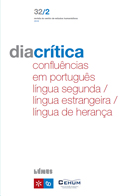Translation of ' culture-specific concepts' in context of indirect translation. The case of "O Assassino", Joe Tang
DOI:
https://doi.org/10.21814/diacritica.5147Keywords:
Indirect translation, Literary translation, Culture-Specific Concepts, O Assassino, Joe TangAbstract
Contact between Portuguese and Chinese began as early as the 16th century. As the relations between China and the Portuguese-speaking countries developed, translations between the two languages have flourished, particularly in literature. It is important to note that, in this domain, direct translation as well as indirect translation has been active options. Translation via a third language has been a frequent method used by Portuguese-Chinese translators – not only in the early days of their burgeoning contact but also well into the twentieth-first century. is paper analyses the translation of the novella O Assassino, which fictions the assassination of the Portuguese Governor Ferreira do Amaral in Macau. The story was originally written in Chinese, then translated into English and then into Portuguese. It happens that the Portuguese version was translated via the English. The aim of this article isto analyze both versions from a comparative perspective and to discuss the translation of culture-specific concepts in the indirect translation context.
References
Accácio, M. A. (2010). Tradução indireta: Uma prática de divulgação e enriquecimento cultural. TradTerm, 16(1), 97-117. DOI: https://doi.org/10.11606/issn.2317-9511.tradterm.2010.46313
Aixela, J. F. (1997). Culture-specific items in translation. Translation, power, subversion. Clevedon, England: Multilingual Matters.
Baker, M. (1992). In other words: A coursebook on translation. London, England: Routledge. DOI: https://doi.org/10.4324/9780203327579
Bassnett, S. & Trivedi, H. (1991). Translation Studies. London & New York: Routledge.
Bauer, W. (1999). The role of intermediate languages in translations from Chinese into German. In V. Alleton & M. Lackner (Eds.), De l’un au multiple. Traductions du chinois vers les langues européennes. Translations from Chinese to European Languages [One into many: Translations from Chinese to European languages] (pp. 19-32). Paris, France: Éditions de la Maison des Sciences de l'Homme. DOI: https://doi.org/10.4000/books.editionsmsh.1474
Bielsa, E. & Bassnett, S. (2009). Translation in global news. London, England: Routledge. DOI: https://doi.org/10.4324/9780203890011
Britto, P. H. (2010). O tradutor como mediador cultural. Synergies Brésil (special issue), 2, 135-141.
Chan, Hok-lam (1988). The Cambridge History of China, Volume 7: The Ming Dynasty, 1368-1644, Part 1. Cambridge, England: Cambridge University Press.
Dollerup, C. (2000). "Relay" and "support" translations. In A. Chesterman, N. G. S. Salvador & Y. Gambier (Eds.), Translation in context: Selected contributions from the EST Congress, Granada 1998 (pp. 17-26). Amsterdam & Philadelphia: John Benjamins. DOI: https://doi.org/10.1075/btl.39.04dol
Gambier, Y. (1994). La retraduction, retour et détour [Retranslation, Revival and Detour]. Meta: Journal des traducteurs, 39(3), 413–417. DOI: https://doi.org/10.7202/002799ar
Gambier, Y. (2004). Doubts and directions in translation studies: Selected Contributions from the EST Congress, Lisbon 2004. Amsterdam, Netherlands: John Benjamins.
Hadley, J. (2017). Indirect translation and discursive identity: Proposing the concatenation effect hypothesis. Translation Studies, 10(2), 183-197. DOI: https://doi.org/10.1080/14781700.2016.1273794
Kittel, H. & Frank, A. P. (1991). Introduction. In H. Kittel & A. P. Frank (Eds.), Interculturality and the Historical Study of Literary Translations (pp. 3-4). Berlin, Germany: Erich Schmidt Verlag.
Landers, C. E. (2001). Becoming a translator: An introduction to the theory and practice of translation. Clevedon, England: Multilingual Matters.
Lefevere, A. (1992). Translation / History / Culture: A sourcebook. London, England: Routledge.
Munday, J. (2001). Introducing translation studies: Theories and applications. London, England: Routledge.
Needham, J. (1959). Science and civilisation in China, Volume 3: Mathematics and the sciences of the heavens and the earth. Cambridge, England: Cambridge University Press.
Newmark, P. (1988). Textbook of Translation. New Jersey, USA: Prentice-Hall International.
Pym, A. (2011). Translation research terms: A tentative glossary for moments of perplexity and dispute. In A. Pym (Ed.), Translation Research Projects 3 (pp. 75-110). Tarragona, Spain: Intercultural Studies Group.
Ringmar, M. (2007). "Roundabouts routes": Some remarks on indirect translations. In F. Mus (Ed.), Selected Papers of the CETRA Research Seminar in Translation Studies 2006. Leuven, Belgium: Katholieke Universiteit Leuven.
Robinson, D. (1997). Becoming a Translator: An Introduction to the theory and practice of translation. London, England: Routledge.
Robyns, C. (1994). Translation and Discursive Identity. Poetics Today, 15(3), 405-428. DOI: https://doi.org/10.2307/1773316
Rodrigues, J. (2014). What is an Indian summer? The Guardian. Retrieved from: https://www.theguardian.com/uk-news/from-the-archive-blog/2014/sep/08/indian-summer-archive. Accessed on: January 12, 2018.
Rosa, A. A., Pięta, H., & Maia, R. B. (2017). Theoretical, methodological and terminological issues regarding indirect translation: An overview. Translation Studies, 10(2), 113-132. DOI: https://doi.org/10.1080/14781700.2017.1285247
Santoyo, J. C. (2010). Translation and Cultural Identity: competence and performance of the author-translator. In M. Muñoz-Calvo & C. Buesa-Gómez (Eds.), Translation and cultural identity: Selected essays on translation and cross-cultural communication, 15-20. Newcastle, England: Cambridge Scholars Publishing.
Tang, J. (2015). O Assassino. Macau, People's Republic of China: Praia Grande Edições.
Toury, G. (1995). Descriptive translation studies and beyond. Amsterdam & Philadelphia: John Benjamins. DOI: https://doi.org/10.1075/btl.4
Toury, G. (2012). Descriptive translation studies and beyond. Amsterdam: John Benjamins Publishing. DOI: https://doi.org/10.1075/btl.100
Venuti, L. (1995). The translator's invisibility. A history of translation. London, England: Routledge.
Venuti, L. (2000). The Translation Studies Reader. London, England: Routledge. DOI: https://doi.org/10.4324/9780203446621
Venuti, L. (2002). The scandals of translation: Towards an ethics of difference. London, England: Routledge. DOI: https://doi.org/10.4324/9780203047873
Downloads
Published
How to Cite
Issue
Section
License
Copyright (c) 2023 Zhou Mengyuan

This work is licensed under a Creative Commons Attribution-NonCommercial 4.0 International License.










